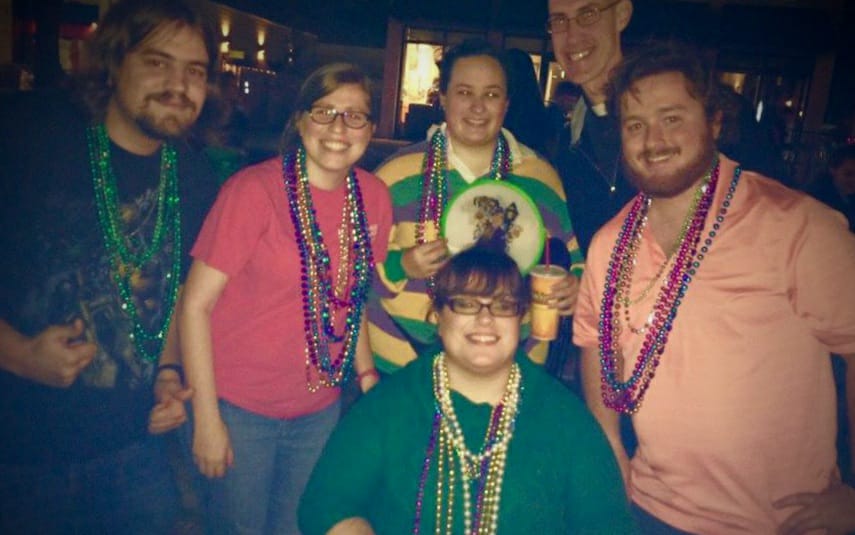I’m a huge fan of social media. It lets me connect with people all over the country or even the world, learn new things and teach others something new, share my beliefs and learn from the beliefs of others. However, it also has exposed me to an onslaught of biphobia, fatphobia, and ableism. Ableism is what I’m going to address specifically in this article, although I will likely be writing about biphobia and fatphobia in the future.
You may be wondering, “well, Janie, what exactly is ableism?” Ableism refers to prejudice against or discrimination against people with disabilities. This could be as overt as a business ignoring Americans With Disabilities Act (ADA) regulations, but it could also be as insidious as a backhanded compliment like telling someone “oh wow! You’re really pretty/well-dressed for someone in a wheelchair!” Comments like this start off nicely (who doesn’t love being called attractive or well-dressed?) but they get into ableist territory with the qualifier “for someone in a wheelchair.” This qualifier suggests that the person giving the “compliment” has preconceived notions about how a person with a disability should look, and that the person with a disability who is being addressed has challenged that preconceived notion. Unfortunately, these preconceived notions often suggest that people with disabilities are seen as less attractive, less fun, less dateable, and less social than their non-disabled peers. This is simply not the case.
As a teenager and young adult, I experimented a lot with makeup and different styles of clothes. I am also a wheelchair user. I cannot begin to tell you how many times I heard the “pretty, for someone in a wheelchair” remark. People who use wheelchairs do not have a certain look. When you get your wheelchair, you are not given a “disabled person” uniform and “how to be a wheelchair user handbook.” Everyone with a disability has their own unique look, personality, style and challenges that may or may not require different accommodations in their wardrobe. (I have to wear certain kinds of shoes that fit over my AFOs. Someone with certain motor skill issues may prefer not to wear button down shirts because they take too long to put on. Stuff like that.) We cannot be lumped into one category based on our disability or the mobility device we use.
I love to get dressed up nicely and wear bold makeup. I’m a big fan of skinny jeans, especially distressed ones or in bold colors, shirts with floral patterns, polka dots, off-the-shoulder or cold-shoulder style tops, maxi skirts, rompers, etc. Many of my friends with disabilities are just as interested in fashion and makeup as I am, though there are definitely people who take a more laid-back approach to how they dress. Lumping us into one group and/or assuming we all look a certain way feeds into other examples of ableism.
One example of a related prejudice against wheelchair users is illustrated by a Ken Jennings quote. He said, “There is nothing sadder than a hot person in a wheelchair.” After my head was finished exploding and I could pick up my jaw off the floor, I knew I had to address this quote in an article for The Mighty. What Ken Jennings is saying here is problematic for a variety of reasons. For starters, he is saying it is sad to see someone in a wheelchair. Why though? What is it that makes people view this as sad? I can see how it might be sad to outsiders if the person in the wheelchair used to walk and no longer can. However, I would suggest a perspective shift might be in order. Instead of seeing using a wheelchair as a sad thing, what if we saw it as a positive thing because it affords people freedom, independence, and a social life?
If we analyze the rest of this quote, there are further problematic messages to be taken from it. If there’s nothing sadder than a “hot” person in a wheelchair, that implies being in a wheelchair takes away from one’s “hotness”/physical attractiveness or “dateability” (that probably isn’t a word but I’m making it a word today. Roll with it… pun totally intended!)

It also suggests people such as Ken Jennings wouldn’t even consider dating a wheelchair user. This view seems to be held by many people. We all have things we want in a partner, and that’s OK. I would want to be with someone who likes to travel, is an animal lover, and wants to adopt or have kids one day. However, eliminating an entire category of people from your dating pool based on a physical characteristic, i.e., people in wheelchairs, is a different story. People with disabilities are not inherently less valuable/lovable/dateable/attractive, although quotes like this sure seem to make it sound like we are. We are just as worthy of love, relationships, marriage and having children. “But Janie! You don’t actually mean to say that disabled people have sex, do you?” Yes. Yes, we do. I’m choosing to wait until marriage due to my religious beliefs, but that’s beside the point. Being disabled doesn’t mean we are all inherently asexual or don’t want to/can’t have kids.
If one holds to Ken Jennings’ beliefs, they will potentially miss out on meeting and dating kind, funny, smart, wonderful individuals. In fact, I would argue that there’s actually nothing sadder than a person who dismisses potential dates based solely on outer characteristics, like being a wheelchair user or being plus-size or whatever else someone might say “no people with [fill in the blank characteristic]” about on a dating profile.
The final quote I want to address was found in a tweet regarding further expectations about people with disabilities. A Daniel Lawson went viral after he tweeted “Disabled parking should only be valid during business hours 9 to 5 Monday to Friday. I cannot see any reason why people with genuine disabilities would be out beyond those times.” Wow. Just wow. Lawson is saying that as an able-bodied person he knows better what disabled people need than the disabled community does. He is saying that non-disabled people should be able to limit the lives of disabled people (even further than they may already be limited by pain, lack of transportation, etc.) to business hours Monday through Friday. That means no dates on Friday night. No church, synagogue, masjid, etc. on the weekends.
You know what? It really doesn’t matter what people with disabilities want to be doing out and about outside of business hours. I am 25 years old and have a decent social life. I have friends. I like karaoke. I go to trivia nights. I go to the movies. I go to church. I am just as entitled to safe access to these spaces as everyone else. Furthermore, my desire to have fun and have a life outside of my home does not mean my disability is less legitimate. I still have a big@$$ scar on my back. I still have weak legs and require a wheelchair for long distances. I still need a shunt to keep my brain from swelling. I still have to take medications to manage the symptoms of my disability. I still battle chronic pain. Regardless, I still deserve to have fun, be social, and meet my friends for dinner and drinks on a Saturday night. It is ableist to suggest otherwise.
What I hope you take away from this article is that people with disabilities really aren’t that different from our able-bodied peers. We are and deserve to be viewed as just as attractive, just as well-dressed, just as dateable, and just as fun as other people. Don’t immediately reject the idea of dating or spending time with wheelchair users or other people with disabilities. Get to know us. We deserve that. We deserve to be given the same chances for friendship, love, and socialization as anyone else. Assuming what people with disabilities can do, what we should do, how we should look, or how dateable we are based on our disability alone will lead to you losing out on wonderful potential friendships and relationships.

